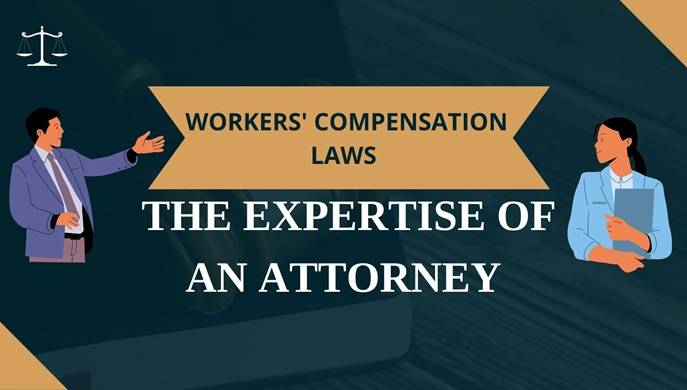Understanding Workers’ Compensation Laws: The Expertise of an Attorney

Workers’ compensation is an essential element of the modern workplace, providing coverage and care for employees injured on the job. With over 2.6 million nonfatal workplace injuries and illnesses occurring in 2021 alone, workers’ compensation laws significantly impact countless employees and employers across the country.
However, the intricacies of these laws often necessitate the expertise of a dedicated workers’ compensation attorney to ensure injured workers receive the maximum benefits they deserve.
The Essence of Workers’ Compensation
At its core, workers’ compensation reflects the “compensation bargain” – assured care in exchange for relinquishing litigation rights over work injuries. Rather than uncertain lawsuits, workers receive no-fault benefits.
This compromise emerged in the 20th century to balance employer and employee needs. Over time, workers’ compensation spread globally, transforming workplace injury handling. Clearly, workers’ compensation remains vital. However, obtaining benefits can be complex, despite the straightforward concept. This is where our legal guidance comes in. As experienced Los Angeles workers compensation lawyers, we help injured workers navigate each step—explaining the process, determining eligibility, properly filing claims, and appealing wrongful denials.
While the system aims to deliver fair treatment without litigation, real-world application can prove challenging. As your trusted advocates, we work to make the process as smooth as possible. We know this system inside and out and will use our expertise to help you get the benefits you deserve.
At its best, workers’ compensation upholds its goals when all parties understand their rights and responsibilities. We aim to provide that clarity for injured workers and employers alike. Let us put our knowledge to work for you, while you focus on recovery.
The Role of an Attorney in Workers’ Compensation
The specific requirements and procedures for securing workers’ compensation vary by state and situation. Navigating these nuances and ensuring full coverage for an injury requires expertise. Hiring a dedicated workers’ compensation attorney significantly increases the chances of obtaining the benefits an injured worker deserves.
Attorneys represent clients throughout the claims process – explaining the law, collecting evidence, and advocating for the maximum allowable compensation.
They challenge unfavorable decisions and help injured workers exercise their rights. With extensive knowledge of state statutes and regulations, attorneys ensure their clients receive fair treatment under the law.
Statutory No-Fault Compensation: A Deep Dive
A foundational element of workers’ compensation is no-fault statutory benefits. Unlike tort lawsuits, workers do not need to prove employer negligence to receive compensation.
Employees who are injured or become ill due to their work may be eligible for workers’ compensation benefits, even if the injuries don’t result from sudden accidents. This allows streamlined and predictable access to coverage.
In exchange for receiving no-fault benefits, employees forfeit the right to sue their employer for pain and suffering damages – the “compensation bargain“. However, workers retain the option to file third-party lawsuits against manufacturers or other entities indirectly responsible for their injuries.
No-fault laws also provide death and disability benefits for families who lose a breadwinner.
Rather than force dependents to prove wrongful death, they receive compensation through dedicated funds. While the no-fault system has trade-offs, it successfully delivers support efficiently and equitably in most cases.
Common Law Remedies and Their Implications
- In certain situations, injured workers may pursue legal action beyond the workers’ compensation system under common law tort rules. Employees can seek damages if employers exhibit gross negligence or intentional wrongdoing.
- However, workers face substantial barriers in tort cases. Employers typically raise the “unholy trinity” defenses – employee contributory negligence, assumption of risk, and the fellow servant rule.
- Contributory negligence bars recovery if the employee’s carelessness played any role. Assumption of risk prevents recovery if employees accept a dangerous work situation. The fellow servant rule protects employers when a coworker’s negligence contributes.
- The high legal hurdles make tort victories rare. However, understanding common law options remains important, as tort claims allow recovery of pain and suffering damages excluded under workers’ compensation.
- Settlements in serious injury cases can reach millions. If disputes arise in the claims process, referencing tort law may motivate an employer to offer a higher settlement.
- In the event of a workplace injury, most states have deadlines for notifying the employer – failing to report on time can jeopardize a claim. As your experienced partners, we guide clients in taking prompt, strategic action.
- Our priority is explaining your options clearly while advocating for maximum compensation. Trust us to handle all legal intricacies smoothly so you can focus on recovery. We’re here to help get the benefits you deserve.
The Unique U.S. Perspective on Workers’ Compensation
While sharing common elements internationally, U.S. workers’ compensation programs reflect state-specific conditions, creating complexity. For instance, maximum temporary disability payments vary widely – Californians receive up to $1,300 weekly vs Texans at $740.
Another distinctive feature is “exclusive remedy” – accepting benefits forfeits additional recovery rights even for employer negligence, limiting but solidifying the compensation bargain. Here’s a visual representation of the comparison of worker’s compensation of maximum temporary disability payment by state:

Source: Employees’ Compensation Appeals Board
Disputes go to administrative rather than civil courts, which some argue favors employers as judges handle local companies repeatedly. Many advocate state court jurisdiction to increase neutrality.
As laws adapt, expert attorneys help employees and employers understand evolving policies. Recent rulings now allow civil lawsuits even after collecting workers’ compensation, challenging exclusive remedy. Ongoing advocacy will shape interpretation.
Navigating this complex, shifting landscape requires expertise. But reformed 21st-century systems can uphold original intent – fairly compensating injured workers regardless of fault. With informed guidance, employees can obtain deserved care and benefits.
Conclusion
Workers’ compensation laws remain vital yet intricate, making legal guidance invaluable when injuries occur. As experienced advocates, attorneys ensure injured workers receive maximum benefits smoothly. We offer needed expertise and advocacy during difficult times.
On-the-job accidents continue daily and laws keep evolving. We recognize that understanding workers’ compensation and the role of attorneys remains essential for injured workers and employers alike. We aim to provide clarity and counsel, keeping people at the core.
At its foundation, the system was created to deliver fair treatment without litigation. By compassionately guiding injured workers, we uphold these ideals in real-world application. We will continue serving as trusted partners, making the law work for those it protects.
Frequently Asked Questions
1 . Why is there a need for an attorney in workers’ compensation cases?
The complex web of laws, regulations, and procedures in workers’ compensation requires expertise to navigate effectively. Legal counsel simplifies the process and protects injured workers’ rights.
2. How do workers’ compensation laws differ by state?
While programs share common elements, specific statutes and regulations vary regarding benefits, dispute resolution, and other factors. Attorneys understand the unique laws of their state.
3. What challenges do employees commonly face when claiming benefits?
Disputes over compensability and benefit amounts are common. Rules around evidence and reporting deadlines can also pose issues. An attorney advocates for employees and provides guidance.











